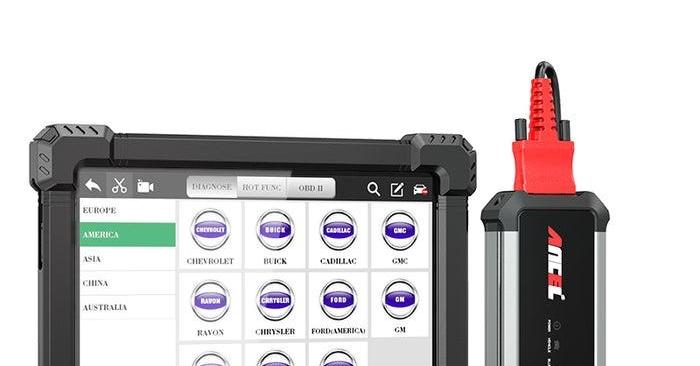Introduction
The world of automotive diagnostics has witnessed a significant transformation over the years, thanks to the advent of car scanners and OBD2 scanners. These devices have become vital tools for car enthusiasts and professionals, enabling them to identify and address potential issues in their vehicles with ease. In this article, we will explore the functionality, advantages, and the pivotal role played by car scanners and OBD2 scanners in maintaining your vehicle’s health.
What is a Car Scanner?
Understanding the Basics
Car Scanners, also known as diagnostic scan tools, are electronic devices designed to communicate with your vehicle’s onboard computer system. These scanners access critical data from your car’s computer, including information about its engine, transmission, emissions, and more. They serve as a bridge between your car and you, providing valuable insights into your vehicle’s overall health.
Types of Car Scanners
There are various types of Car Scanners available, ranging from basic code readers to advanced diagnostic tools. Depending on your needs and expertise, you can choose a scanner that best suits you.
The Role of OBD2 Scanners
OBD2: The Standard Language
On-Board Diagnostics 2 (OBD2) is a standardized system implemented in most cars manufactured after 1996. OBD2 scanners are designed to work with this system, making them compatible with a wide range of vehicles.
How OBD2 Scanners Work
OBD2 scanner retrieve diagnostic trouble codes (DTCs) generated by your car’s computer. These codes indicate specific issues or malfunctions within your vehicle, helping you identify the root cause of problems.
Why Do You Need a Car Scanner?
Preventive Maintenance
Regular diagnostic checks can help identify issues before they escalate into major problems, saving you time and money in the long run.
Fuel Efficiency
Car scanners can provide insights into your car’s fuel consumption, allowing you to make adjustments for better efficiency.
Safety on the Road
Knowing your car’s health status ensures a safe and trouble-free driving experience.
Choosing the Right Car Scanner
Compatibility
It’s crucial to choose a scanner that is compatible with your car’s make and model for accurate results.
User-Friendliness
Opt for a user-friendly scanner with clear instructions to make diagnostics hassle-free.
Additional Features
Some scanners offer extra features like live data streaming and compatibility with smartphones, enhancing the overall experience.
Using Your Car Scanner
Connecting the Scanner
Connecting your scanner to the OBD2 port in your car is a straightforward process. Follow the manufacturer’s instructions for a hassle-free connection.
Interpreting Diagnostic Codes
Understanding the diagnostic trouble codes is essential. You can find code explanations in the scanner’s manual or online resources.
Benefits of Regular Diagnostics
Cost Savings
Addressing issues early on can prevent costly repairs in the future.
Extending Your Car’s Lifespan
Regular maintenance increases the longevity of your vehicle.
Peace of Mind
Knowing your car’s health provides peace of mind during your journeys.
OBD2 Scanners vs. Traditional Mechanics
OBD2 scanners empower car owners to take charge of their vehicle’s diagnostics. However, it’s important to note that they are complementary to the services provided by traditional mechanics, who possess the expertise to perform advanced repairs.
Common Misconceptions
Car Scanners are Only for Professionals
Car scanners are designed to be user-friendly and accessible to all car owners, not just professionals.
Diagnosing Means Costly Repairs
Identifying issues early on allows you to address them before they become expensive problems.
How to Maintain Your Car with the Help of Scanners
DIY Repairs
Basic diagnostics empower you to perform minor repairs, saving money and time.
Scheduled Maintenance
Scanners help you keep track of your car’s maintenance schedule, ensuring it stays in optimal condition.
Car Scanner Safety
Always use car scanners in a safe and controlled environment to avoid accidents or malfunctions while driving.
The Future of Car Diagnostics
Advancements in technology continue to improve car scanners, making them even more user-friendly and capable of performing advanced diagnostics. The future holds great promise for car enthusiasts and mechanics alike.
Conclusion
Car Scanners and OBD2 Scanners have become invaluable tools in the automotive world, allowing car owners to maintain and diagnose their vehicles effectively. By investing in the right scanner and embracing regular diagnostics, you not only save money but also ensure a safe and enjoyable driving experience.
FAQs
1. How often should I use a car scanner?
The frequency of scanning depends on your vehicle’s age and usage. Performing diagnostics every 3-6 months is a good practice.
2. Can a car scanner detect all car problems?
Car scanners can identify most issues related to your car’s onboard systems, but they may not pinpoint problems in non-electronic components.
3. Are OBD2 scanners compatible with all car makes and models?
Most OBD2 scanners are compatible with a wide range of vehicles manufactured after 1996, but it’s essential to check compatibility before purchasing.

